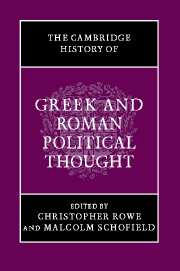Book contents
- Frontmatter
- Introduction
- PART I ARCHAIC AND CLASSICAL GREECE
- 1 Greek political thought: the historical context
- THE BEGINNINGS
- ARISTOTLE
- 15 Aristotle: an introduction
- 16 Naturalism
- 17 Justice and the polis
- 18 Aristotelian constitutions
- 19 The Peripatos after Aristotle
- PART II THE HELLENISTIC AND ROMAN WORLDS
- Epilogue
- Bibliographies
- Index
- Map 1. Greece in the fifth century bc"
- References
17 - Justice and the polis
from ARISTOTLE
Published online by Cambridge University Press: 28 March 2008
- Frontmatter
- Introduction
- PART I ARCHAIC AND CLASSICAL GREECE
- 1 Greek political thought: the historical context
- THE BEGINNINGS
- ARISTOTLE
- 15 Aristotle: an introduction
- 16 Naturalism
- 17 Justice and the polis
- 18 Aristotelian constitutions
- 19 The Peripatos after Aristotle
- PART II THE HELLENISTIC AND ROMAN WORLDS
- Epilogue
- Bibliographies
- Index
- Map 1. Greece in the fifth century bc"
- References
Summary
The aim of all of Aristotle’s practical philosophy is to provide a description of the best life for a human being, along with an understanding of how that life is to be achieved or at least approached. The discussion of individual happiness (eudaimonia) in the ethical writings and the discussion of political arrangements in the Politics are complementary and equally necessary parts of that inquiry. The happiness of an individual is that of a naturally political animal whose life and happiness are essentially interwoven with that of his fellow citizens. The happiness of a city is nothing other than the happiness of the individuals who constitute it. The best or happy life is the life of virtue. Justice, in one of its forms, is complete virtue in an individual. The best life is thus the just life, and the best city the one populated by just citizens. This much said, much remains to be explained, in particular, what Aristotle thought justice was.
Aristotle’s writings about justice, found chiefly in the fifth book of the Nicomachean Ethics and the third book of the Politics, are notoriously difficult. If there is any explanation for this apart from the combination of the complexity of the issues being dealt with, the state of our texts, and the identity of the author, it has to do with Aristotle’s characteristic method of answering philosophical questions. He approaches all topics through the views of his predecessors, often quite explicitly.
- Type
- Chapter
- Information
- The Cambridge History of Greek and Roman Political Thought , pp. 344 - 365Publisher: Cambridge University PressPrint publication year: 2000
References
- 5
- Cited by

